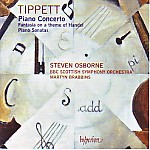Stunning, simply stunning! Michael Tippett’s greatness as a composer reveals itself perhaps most eloquently in his piano music. Freed of the awkward texts of his operas, or the complexities of his often busy orchestrations, his music speaks in terms of the keyboard with passion, eloquence, and directness. He was one of the very few modern composers who was able to personalize the piano, writing music unmistakably his own in the medium. Tippett had a mania for the number four: four symphonies, four concertos, and four piano sonatas. The latter represent all four facets of his style, from early maturity to his last period, and they do it at a more consistent level of musical excellence than any other single group of his works.
Steven Osborne’s performances equal and often surpass those of Paul Crossley, whose complete edition on CRD seemed destined to be practically unbeatable. The fact is that Osborne is just that much more expressively intense: in the alternately angry and lyrical episodes in the Second sonata, in the virtuoso figurations in the finale of the Third sonata, and in projecting the magisterial arch of diverse material that characterizes the Fourth. These are, one and all, magnificent performances that should make converts of many a doubter. Tippett’s later music isn’t easy, but it operates through clearly defined musical ideas that convey easily identifiable emotional states; it is this communicative clarity that Osborne projects as no one else has.
Tippett’s Piano Concerto is unique in the 20th century literature for its rapturous lyricism and long, singing lines. The “magical” atmosphere of the opera The Midsummer Marriage permeates the score, especially during the exchanges between piano and celesta in the first movement and finale. John Ogden’s premiere recording under Colin Davis has retained pride of place until now, but this version features better playing by the orchestra, much better sound, and in Osborne an interpreter of even deeper sympathy and penetration. One of his special abilities, so evident in the sonatas too, is his ability to spin out Tippett’s rhythmically quirky melodic cantilenas with great naturalness, and in this of all concertos no quality is more important. Throw in an exuberant account of the Handel Fantasia, and here you have it: the best available performances of Tippett’s major piano works, all conveniently packaged on two very well filled CDs. An event not to be missed! [12/18/2007]
































